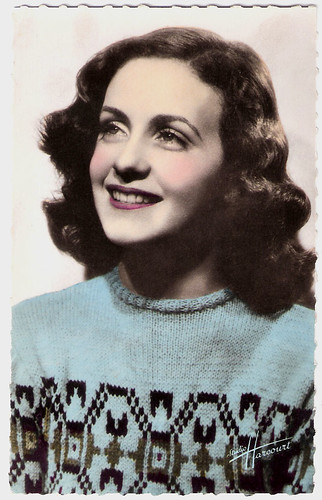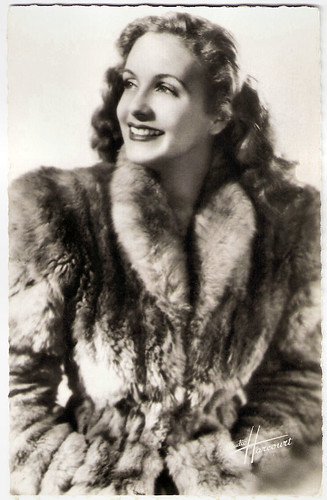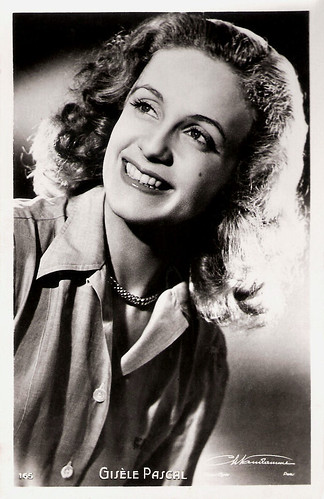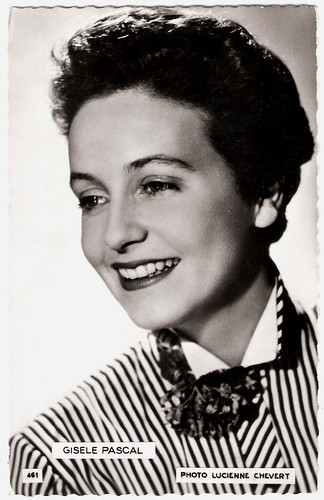Gisèle Pascal (1921-2007) was an attractive French film actress and a lover of Rainier III, Prince of Monaco.
![Gisèle Pascal]()
French postcard by O.P., Paris, no. 34. Photo: Studio Harcourt.
Beautiful Ingénue
Gisèle (sometimes Giselle) Pascal was born Gisèle Marie Madeleine Tallone in Cannes, France in 1921. She studied shorthand and typing and intended to become a secretary, but she also attended dance classes. She was spotted by the film director Marc Allégret, who recommended her to actor-director Claude Dauphin, with whom she made her stage début. Allégret also cast her in L'Arlésienne/The Girl from Arles (Marc Allégret, 1942), based on Alphonse Daudet's play of the same name. Her co-stars were the popular comedian Raimu and the young Louis Jourdan. Raimu reportedly loved the Provençal accent of the beautiful ingénue. She also appeared in Allégret’s La belle aventure/Twilight (Marc Allégret, 1942) starring Claude Dauphin and Micheline Presle. She also appeared with María Denis and Louis Jourdan in La vie de bohème/ Bohemian life (Marcel L’Herbier, 1945). After the war, she played lead parts in such melodramas as Tombé du ciel/Dropped From Heaven (Emil E. Reinert, 1946) and Dernier refuge/Last Refuge (Alex Joffé, 1947). The latter, based on Le Locataire (The Lodger) by Georges Simenon, wasn't successful. She also starred in such musical comedies as Mademoiselle s'amuse/Mademoiselle has Fun (Jean Boyer, 1948) and La Petite chocolatière/The Chocolate Girl (André Berthomieu, 1950), with Claude Dauphin.
![Gisèle Pascal]()
French postcard by Editions P.I., no. 146, La Garenne Colombes, offered by Les Carbones Korés Carboplane, no. 55. Photo: Roger Carlet.
![Gisèle Pascal]()
French postcard by O.P., Paris, no. 241. Photo: Studio Harcourt, Paris.
A Royal Affair
For ten years, Gisèle Pascal had a royal affair with Prince Rainier. Pierre Perrone in The Independent: “Pascal had caught the eye of Rainier when he was a student at Montpellier University during the Second World War and she was treading the boards in boulevard plays. For a time, the couple openly shared a villa in Saint-Jean-Cap-Ferrat on the French Riviera when she wasn't away in Paris filming. There was even talk of marriage but, when Rainier ascended to the throne of the tiny principality in 1949 after the death of his father, Prince Louis II, his relationship with Pascal came under increasing pressure and eventually floundered.” Meddlesome Princess Antoinette, Rainier's older sister, seeking to obtain the throne of Monaco for her own son, spread malicious rumours that Pascal was incapable of bearing children. A contemplated marriage was called off when a medical examination claimed that she was infertile. Perrone: “Snobbery certainly also played a part in Rainier's wavering and eventual decision, since Pascal came from humble Italian stock and had worked in her parents' grocery as a child.” After her break-up with Rainier, she made one of her best films, Horizons sans fin/Endless Horizons (Jean Dreville, 1953) with Jean Chevrier. She portrayed the French pilot Hélène Boucher, who held seven world records and died in a plane crash in 1934. Hal Erickson at AllMovie: “Though the world of aviation was still essentially an all-male one (despite England's Amy Johnson and America's Amelia Earhart), Boucher perseveres, eventually breaking all existing male and female speed and height records. A bit slow on the uptake in the dramatic scenes, the film soars (no pun intended) during the aerial sequences. Horizons san Fin was the winner of the Catholic Award at the 1953 Cannes Film Festival.” Pascal took flying lessons to add credibility to her performance as Boucher. While promoting Horizons sans fin in Cannes, she met Hollywood star Gary Cooper. The couple became the talk of the festival but their affair ended when the actor's wife and daughter joined him in Paris a few weeks later.
![Gisèle Pascal]()
French postcard by P.I., Paris, no. 165, presented by Les Carbones Korès 'Carboplane'. Photo: Ch. Vandamme, Paris.
![Gisèle Pascal]()
French postcard by Editions du Globe, no. 797. Photo: Studio Harcourt, Paris.
Social Realism
In 1954, Gisèle Pascal winked to her affair with the Prince with her appearances in the historical drama Si Versailles m'était conté/Royal Affairs in Versailles (Sacha Guitry, 1954) which portrayed the personalities who lived in the Royal Palace, the Chateau of Versailles. She also appeared in the sequel, Si Paris nous était conté/If Paris Were Told to Us (Sacha Guitry, 1956). In 1955, she married actor Raymond Pellegrin. They had worked together on the ‘social realism’ dramas Le Feu dans la peau/Fire Under the Skin (Marcel Blistène, 1953) and Marchandes d'illusions/Women Without Shame (Raoul André, 1954) . Previously she had had a crush on Pellegrin when they had both appeared in the same play, but he was married to actress Dora Doll. However, their friendship blossomed into a relationship, and after his divorce they married. In 1962, they would have a daughter, actress Pascale Pellegrin. She returned to the screen in Le Masque de fer/The Iron Mask (Henri Decoin, 1962) inspired by the novels by Alexandre Dumas. Jean Marais played the aging d’Artagnan on his mission to rescue the imprisoned brother of Louis XIV. After taking a break from radio, theatre and film work in the 1970s, she played character parts in En haut des marches/At the Top of the Stairs (Paul Vecchiali, 1983) starring Danielle Darrieux, the comedy Les Compères/The fellows (Francis Veber, 1983) featuring Pierre Richard and Gérard Depardieu and remade in the US as Fathers' Day (1997), the drama La Femme publique/The Public Woman (Andrzej Zulawski, 1983), and Juillet en septembre/July in September (Sébastien Japrisot, 1988). She also acted in several television series in France and Germany. Gisèle Pascal died in 2007 in Nîmes, France. She was 85.
![Gisèle Pascal]()
French postcard by Editions du Globe, Paris. Photo: Lucienne Chevert.
![Gisèle Pascal]()
French postcard by P.I., Paris, no. 461. Photo: Lucienne Chevert.
Sources: Pierre Perrone (The Independent), Hal Erickson (AllMovie), CinéMémorial (French), AllMovie, Wikipedia, and IMDb.

French postcard by O.P., Paris, no. 34. Photo: Studio Harcourt.
Beautiful Ingénue
Gisèle (sometimes Giselle) Pascal was born Gisèle Marie Madeleine Tallone in Cannes, France in 1921. She studied shorthand and typing and intended to become a secretary, but she also attended dance classes. She was spotted by the film director Marc Allégret, who recommended her to actor-director Claude Dauphin, with whom she made her stage début. Allégret also cast her in L'Arlésienne/The Girl from Arles (Marc Allégret, 1942), based on Alphonse Daudet's play of the same name. Her co-stars were the popular comedian Raimu and the young Louis Jourdan. Raimu reportedly loved the Provençal accent of the beautiful ingénue. She also appeared in Allégret’s La belle aventure/Twilight (Marc Allégret, 1942) starring Claude Dauphin and Micheline Presle. She also appeared with María Denis and Louis Jourdan in La vie de bohème/ Bohemian life (Marcel L’Herbier, 1945). After the war, she played lead parts in such melodramas as Tombé du ciel/Dropped From Heaven (Emil E. Reinert, 1946) and Dernier refuge/Last Refuge (Alex Joffé, 1947). The latter, based on Le Locataire (The Lodger) by Georges Simenon, wasn't successful. She also starred in such musical comedies as Mademoiselle s'amuse/Mademoiselle has Fun (Jean Boyer, 1948) and La Petite chocolatière/The Chocolate Girl (André Berthomieu, 1950), with Claude Dauphin.

French postcard by Editions P.I., no. 146, La Garenne Colombes, offered by Les Carbones Korés Carboplane, no. 55. Photo: Roger Carlet.

French postcard by O.P., Paris, no. 241. Photo: Studio Harcourt, Paris.
A Royal Affair
For ten years, Gisèle Pascal had a royal affair with Prince Rainier. Pierre Perrone in The Independent: “Pascal had caught the eye of Rainier when he was a student at Montpellier University during the Second World War and she was treading the boards in boulevard plays. For a time, the couple openly shared a villa in Saint-Jean-Cap-Ferrat on the French Riviera when she wasn't away in Paris filming. There was even talk of marriage but, when Rainier ascended to the throne of the tiny principality in 1949 after the death of his father, Prince Louis II, his relationship with Pascal came under increasing pressure and eventually floundered.” Meddlesome Princess Antoinette, Rainier's older sister, seeking to obtain the throne of Monaco for her own son, spread malicious rumours that Pascal was incapable of bearing children. A contemplated marriage was called off when a medical examination claimed that she was infertile. Perrone: “Snobbery certainly also played a part in Rainier's wavering and eventual decision, since Pascal came from humble Italian stock and had worked in her parents' grocery as a child.” After her break-up with Rainier, she made one of her best films, Horizons sans fin/Endless Horizons (Jean Dreville, 1953) with Jean Chevrier. She portrayed the French pilot Hélène Boucher, who held seven world records and died in a plane crash in 1934. Hal Erickson at AllMovie: “Though the world of aviation was still essentially an all-male one (despite England's Amy Johnson and America's Amelia Earhart), Boucher perseveres, eventually breaking all existing male and female speed and height records. A bit slow on the uptake in the dramatic scenes, the film soars (no pun intended) during the aerial sequences. Horizons san Fin was the winner of the Catholic Award at the 1953 Cannes Film Festival.” Pascal took flying lessons to add credibility to her performance as Boucher. While promoting Horizons sans fin in Cannes, she met Hollywood star Gary Cooper. The couple became the talk of the festival but their affair ended when the actor's wife and daughter joined him in Paris a few weeks later.

French postcard by P.I., Paris, no. 165, presented by Les Carbones Korès 'Carboplane'. Photo: Ch. Vandamme, Paris.

French postcard by Editions du Globe, no. 797. Photo: Studio Harcourt, Paris.
Social Realism
In 1954, Gisèle Pascal winked to her affair with the Prince with her appearances in the historical drama Si Versailles m'était conté/Royal Affairs in Versailles (Sacha Guitry, 1954) which portrayed the personalities who lived in the Royal Palace, the Chateau of Versailles. She also appeared in the sequel, Si Paris nous était conté/If Paris Were Told to Us (Sacha Guitry, 1956). In 1955, she married actor Raymond Pellegrin. They had worked together on the ‘social realism’ dramas Le Feu dans la peau/Fire Under the Skin (Marcel Blistène, 1953) and Marchandes d'illusions/Women Without Shame (Raoul André, 1954) . Previously she had had a crush on Pellegrin when they had both appeared in the same play, but he was married to actress Dora Doll. However, their friendship blossomed into a relationship, and after his divorce they married. In 1962, they would have a daughter, actress Pascale Pellegrin. She returned to the screen in Le Masque de fer/The Iron Mask (Henri Decoin, 1962) inspired by the novels by Alexandre Dumas. Jean Marais played the aging d’Artagnan on his mission to rescue the imprisoned brother of Louis XIV. After taking a break from radio, theatre and film work in the 1970s, she played character parts in En haut des marches/At the Top of the Stairs (Paul Vecchiali, 1983) starring Danielle Darrieux, the comedy Les Compères/The fellows (Francis Veber, 1983) featuring Pierre Richard and Gérard Depardieu and remade in the US as Fathers' Day (1997), the drama La Femme publique/The Public Woman (Andrzej Zulawski, 1983), and Juillet en septembre/July in September (Sébastien Japrisot, 1988). She also acted in several television series in France and Germany. Gisèle Pascal died in 2007 in Nîmes, France. She was 85.

French postcard by Editions du Globe, Paris. Photo: Lucienne Chevert.

French postcard by P.I., Paris, no. 461. Photo: Lucienne Chevert.
Sources: Pierre Perrone (The Independent), Hal Erickson (AllMovie), CinéMémorial (French), AllMovie, Wikipedia, and IMDb.